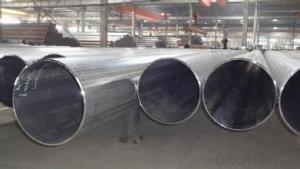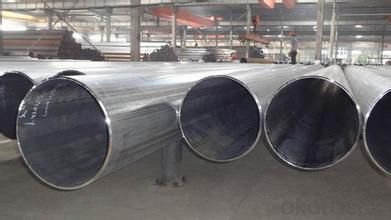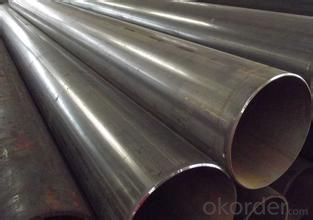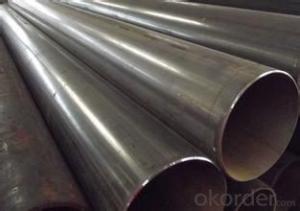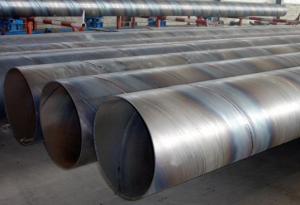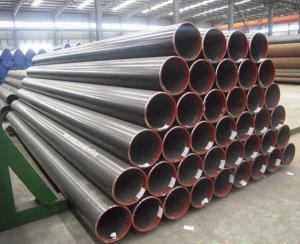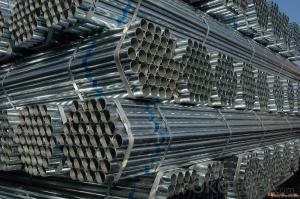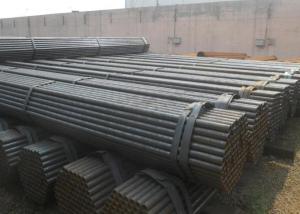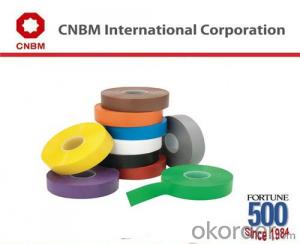A Aariety of High-frequency Welded Pipe ERW Utility
- Loading Port:
- China main port
- Payment Terms:
- TT or LC
- Min Order Qty:
- 10 m.t.
- Supply Capability:
- 5000 m.t./month
OKorder Service Pledge
OKorder Financial Service
You Might Also Like
Product Description:
It is widely applied to line pipe and casing and tubing in oil transportation and casing field, and it is used in Low,high pressure liquid and gassy transportation and it is also good Structure pipe (for furniture, window, door, building , bridge, mechanical etc).
Standard of ERW Welded Pipes: API SPEC 5L, API SPEC 5CT, ASTM A53, GB/T9711.1
Steel Grade of ERW Welded Pipes:API SPEC 5L: B, X42, X46, X52, X56, X60, X65
API SPEC 5CT: J55, K55, N80, L80-1
ASTM A53: A, B, C
GB/T9711.1:L242、L290、L320、L360、L390、L415、L450
Sizes of ERW Welded Pipes:
Standard: GB/9711.1
Mechanical Properties
Remark: Besides below sizes, we also can arrange production based on requirement of customers
OD | WT | WEIGHT | ||||
INCH | MM | SCH | MM | INCH | KG/M | LB/INCH |
1 1/2” | 48.3 | STD-40 | 3.68 | 0.145 | 4.09 | 2.75 |
1 1/2” | 48.3 | XS-80 | 5.08 | 0.2 | 5.47 | 3.68 |
2” | 60.3 | STD-40 | 3.91 | 0.154 | 5.49 | 3.69 |
2” | 60.3 | XS-80 | 5.54 | 0.218 | 7.56 | 5.08 |
2 1/2” | 73 | STD-40 | 5.16 | 0.203 | 8.72 | 5.86 |
2 1/2” | 73 | XS-80 | 7.01 | 0.276 | 11.52 | 7.74 |
3” | 88.9 | STD-40 | 5.49 | 0.216 | 11.41 | 7.67 |
3” | 88.9 | XS-80 | 7.62 | 0.3 | 15.43 | 10.37 |
3 1/2” | 101.6 | STD-40 | 5.74 | 0.226 | 13.71 | 9.21 |
3 1/2” | 101.6 | XS-80 | 8.08 | 0.318 | 18.83 | 12.65 |
4” | 114.3 | STD-40 | 6.02 | 0.237 | 16.24 | 10.91 |
4” | 114.3 | XS-80 | 8.56 | 0.337 | 22.55 | 15.15 |
5” | 141.3 | STD-40 | 6.55 | 0.258 | 21.99 | 14.78 |
5” | 141.3 | XS-80 | 9.53 | 0.375 | 31.28 | 21.02 |
6” | 168.3 | STD-40 | 7.11 | 0.28 | 28.55 | 19.19 |
6” | 168.3 | XS-80 | 10.97 | 0.432 | 42.99 | 28.89 |
8” | 219.1 | STD-40 | 8.18 | 0.322 | 42.98 | 28.88 |
8” | 219.1 | XS-80 | 12.7 | 0.5 | 65.3 | 43.88 |
10” | 273 | STD-40 | 9.27 | 0.365 | 60.9 | 40.92 |
10” | 273 | 80 | 15.09 | 0.594 | 96.95 | 65.15 |
12” | 323.8 | STD | 9.53 | 0.375 | 74.61 | 50.13 |
12” | 323.8 | 40 | 10.31 | 0.406 | 80.51 | 54.1 |
12” | 323.8 | XS | 12.7 | 0.5 | 98.42 | 66.14 |
12” | 323.8 | 80 | 17.48 | 0.688 | 133.38 | 89.63 |
14” | 355.6 | 40 | 11.13 | 0.438 | 95.51 | 64.18 |
14” | 355.6 | XS | 12.7 | 0.5 | 108.48 | 72.9 |
14” | 355.6 | 80 | 19.05 | 0.75 | 159.71 | 107.32 |
16” | 406.4 | XS-40 | 12.7 | 0.5 | 124.55 | 83.69 |
18” | 457 | STD | 9.53 | 0.375 | 106.23 | 71.38 |
18” | 457 | 40 | 14.27 | 0.562 | 157.38 | 105.75 |
18” | 457 | 80 | 23.83 | 0.938 | 257.13 | 172.78 |
20” | 508 | 40 | 15.09 | 0.594 | 185.28 | 124.5 |
20” | 508 | 80 | 26.19 | 1.031 | 314.33 | 211.22 |
FAQ of Welded Pipe:
①How is the quality of your products?
Our products are manufactured strictly according to national and internaional standard, and we take a test on every pipe before delivered out. If you want see our quality certifications and all kinds of testing report, please just ask us for it.
Guaranteed: If products’ quality don’t accord to discription as we give or the promise before you place order, we promise 100% refund.
②How about price?
Yes, we are factory and be able to give you lowest price below market one, and we have a policy that “ for saving time and absolutely honest business attitude, we quote as lowest as possible for any customer, and discount can be given according to quantity”,if you like bargain and factory price is not low enough as you think, just don’t waste your time.Please trust the quotation we would give you, it is professional one.
③Why should you chose us?
Chose happens because of quality, then price, We can give you both.Additionally, we can also offer professional products inquiry, products knowledge train(for agents), smooth goods delivery, exellent customer solution proposals.Our service formula: good quality+good price+good service=customer’s trust
SGS test is available, customer inspection before shipping is welcome, third party inspection is no problem.
Any question, pls feel free to contact us !
Welded Pipe Images:
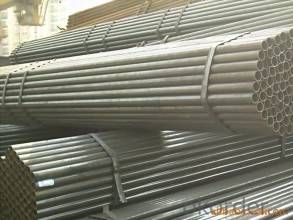
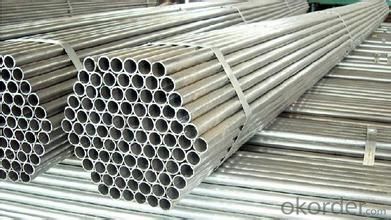
- Q: Are steel pipes affected by UV rays?
- Yes, steel pipes can be affected by UV rays. Prolonged exposure to UV radiation can lead to the degradation of the protective coatings on steel pipes, causing them to corrode and weaken over time. It is important to implement proper protective measures, such as applying UV-resistant coatings or using protective covers, to mitigate the impact of UV rays on steel pipes.
- Q: What are the advantages of using steel pipes in construction projects?
- Using steel pipes in construction projects offers numerous benefits. Firstly, the strength and durability of steel pipes are remarkable. With a high tensile strength, they can withstand heavy loads and pressures without any deformation or breakage. This makes them ideal for projects that require structural integrity, such as building construction, bridge building, and infrastructure development. Secondly, steel pipes exhibit exceptional resistance to corrosion. They are typically coated with protective layers, like galvanized zinc or epoxy, which prevent rusting and extend their lifespan. Consequently, steel pipes are suitable for both aboveground and underground applications, including water and sewage systems, oil and gas pipelines, and industrial processing plants. Furthermore, steel pipes offer great versatility in terms of shape and size. They can be manufactured in various diameters and thicknesses, allowing for customization to meet specific project requirements. This flexibility in design makes steel pipes suitable for a wide range of applications in construction, including plumbing, HVAC systems, and structural supports. Moreover, steel pipes are relatively easy to install and maintain. They can be welded, threaded, or bolted together, providing a secure and leak-proof connection. This ease of installation reduces construction time and labor costs. Additionally, steel pipes require minimal maintenance, as they are resistant to cracking, chipping, and warping. This makes them a cost-effective choice over the long term. Lastly, steel pipes are environmentally friendly. They are 100% recyclable, meaning they can be reused and repurposed without compromising their structural integrity. By recycling steel pipes, the demand for new raw materials is reduced, and waste generation is minimized. Therefore, steel pipes are a sustainable option for construction projects. In summary, the advantages of using steel pipes in construction projects encompass their strength, corrosion resistance, versatility, ease of installation and maintenance, and environmental sustainability. These attributes make steel pipes a reliable and cost-effective choice for a wide range of applications in the construction industry.
- Q: What are the lengths of scaffold steel tubes?
- Scaffolding steel pipe standard length is 6 meters, for easy use, respectively, 6 meters, 3 meters, 2 meters, 1.5 meters, 1 meters, etc., if there is a special length, you need to intercept.
- Q: What are the factors to consider when selecting steel pipes for a specific application?
- When selecting steel pipes for a specific application, several factors need to be considered. The key factors include the required strength and durability, corrosion resistance, temperature and pressure requirements, size and dimensions, cost considerations, and compatibility with other materials or systems. Additionally, factors such as the intended environment, installation requirements, and regulatory compliance should also be taken into account to ensure the optimal selection of steel pipes for the particular application.
- Q: How are steel pipes used in the manufacturing of oil refineries?
- Steel pipes are used extensively in oil refineries for various purposes. They are primarily used for transporting crude oil, refined petroleum products, and various chemicals within the refineries. These pipes are also crucial for the distribution of water, steam, and other fluids required for the refining processes. Additionally, steel pipes are used in the construction of various equipment and structures in oil refineries, including storage tanks, heat exchangers, and process units. Overall, steel pipes play a vital role in ensuring the safe and efficient operation of oil refineries.
- Q: Can steel pipes be used for the construction of transmission towers?
- Yes, steel pipes can be used for the construction of transmission towers. Steel pipes are commonly used in the construction industry due to their strength, durability, and ability to withstand heavy loads. They provide structural support and stability required for transmission towers, making them a suitable choice for this application.
- Q: Are steel pipes suitable for fire protection systems?
- Yes, steel pipes are suitable for fire protection systems. They have excellent fire resistance properties and can withstand high temperatures, making them ideal for conveying water or other fire suppressants in fire protection systems. Steel pipes are also strong, durable, and resistant to corrosion, ensuring long-term reliability and effectiveness in fire protection applications.
- Q: How are steel pipes tested for pressure and leakage?
- To ensure the safety and reliability of steel pipes, various methods are employed to test them for pressure and leakage. Hydrostatic testing is a commonly used technique, whereby the pipe is filled with water and subjected to a specific pressure for a set period of time. This examination aims to detect any weaknesses or leaks by observing if there is a drop in pressure or visible water leakage. The test carefully monitors and measures the pressure, and if the pipe successfully withstands the required pressure without any signs of leakage, it is deemed to have passed. In addition to hydrostatic testing, other non-destructive methods can also be utilized. Ultrasonic testing, for instance, employs high-frequency sound waves to identify flaws or defects in the pipe material. Similarly, magnetic particle testing involves the application of a magnetic field to the pipe and inspecting it for any magnetic particles that may indicate cracks or imperfections. Furthermore, visual inspection is a crucial component of the pressure and leakage testing of steel pipes. Trained inspectors thoroughly examine both the exterior and interior surfaces of the pipe to detect any visible signs of damage, such as corrosion, cracks, or faulty welds. This visual assessment aids in identifying potential weak points that may lead to leaks or failures under pressure. In summary, a comprehensive evaluation of steel pipes for pressure and leakage involves a combination of hydrostatic testing, non-destructive methods, and visual inspection. These rigorous procedures guarantee that the pipes meet the required standards and are safe for their intended applications.
- Q: What are the advantages of using steel pipes in the manufacturing of furniture?
- Using steel pipes in the manufacturing of furniture offers several advantages. Firstly, steel pipes are known for their strong and durable nature, providing furniture with the necessary strength and stability. Additionally, steel pipes have a high load-bearing capacity, making them suitable for supporting heavy furniture items. Furthermore, steel pipes are resistant to rust and corrosion, ensuring the longevity of the furniture. Lastly, steel pipes can be easily shaped and welded, allowing for versatile and customizable furniture designs.
- Q: Can steel pipes be bent or shaped to meet specific requirements?
- Yes, steel pipes can be bent or shaped to meet specific requirements. The process of bending or shaping steel pipes is known as pipe bending. It involves using specialized machinery and techniques to manipulate the pipe into the desired shape. Various methods can be employed, including hot bending, cold bending, and induction bending. The choice of method depends on factors such as the size and thickness of the pipe, the required bend radius, and the specific application. Pipe bending is commonly used in industries such as construction, oil and gas, automotive, and manufacturing to create custom pipe configurations that fit specific requirements and allow for efficient installation and functionality.
Send your message to us
A Aariety of High-frequency Welded Pipe ERW Utility
- Loading Port:
- China main port
- Payment Terms:
- TT or LC
- Min Order Qty:
- 10 m.t.
- Supply Capability:
- 5000 m.t./month
OKorder Service Pledge
OKorder Financial Service
Similar products
Hot products
Hot Searches
Related keywords
